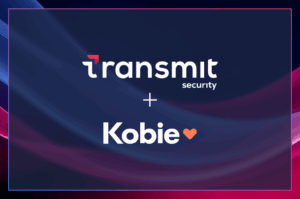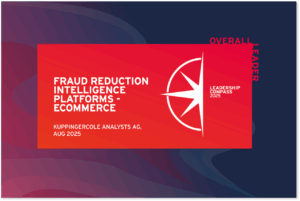With a sluggish US economy, rising just 1.1% last quarter, global companies are looking for new ways to increase profitability — areas within their control. Preventing fraud is exactly that, and if done right, it’s an ideal strategy for businesses to cut their financial losses and attract more customers.
Just consider the cost of fraud. A report from Juniper Research projects online payment fraud will exceed $343 billion globally between 2023 and 2027. This cost includes losses across digital and physical goods, money transfers and banking. A major factor is the rise of account opening fraud, up 109% YoY, according to a 2022 fraud report by Javelin.
The good news: a significant percentage of new account fraud can be prevented with data validation, a form of passive identity proofing that instantly determines if the information users provide is accurate and authentic. Customers follow a typical registration flow, entering their data to establish trust. There’s no photo ID or selfie required, and the process is fully automated.
Frictionless data validation does nothing to disrupt legitimate customers, so it’s one of the easiest ways to improve metrics related to customer acquisitions, customer satisfaction and retention. You’ll also meet strategic and operational key performance indicators (KPIs) by reducing fraud, overhead costs and complexity. In this blog, we’ll tell you how, covering 5 ways data validation helps you reach the ultimate KPI: increased profits.
1. Data validation prevents fraud
By assessing the user’s claimed identity in a fraction of a second, data validation stops fraud before it starts. Without this security measure, bad actors can easily create fraudulent accounts, open new lines of credit, purchase goods with stolen credit card data or conduct other schemes. They simply enroll with synthetic or stolen identities, which can be purchased online.
In a recent play-on-demand webinar, a Transmit Security threat researcher gives an actual tour of a dark web marketplace where threat actors are selling social security numbers (SSNs) paired with personal data, even valid IDs. In many cases, they’re using highly evasive registration bots, which contribute to the growing volume of new account fraud. Faced with this reality, companies risk being an easy target if they don’t use some form of identity proofing.
How does data validation reduce fraud? Automated data verification and background checks spot mismatched, untrusted, stolen or blacklisted identity data to prevent bad actors from opening fraudulent accounts. You’ll instantly know if the identity truly exists and is linked to the individual’s data and device. If the data doesn’t align, you can challenge the user with step-up authentication, identity verification or deny access completely.
2. It minimizes complexity & overhead
An aggregated data validation service removes complexity and costs by connecting to a wide range of sources — through a single API. You can check watchlists, credit bureaus, phone registers, email blacklists and dozens of other sources. A plug-and-play service simplifies implementation and accelerates time to value. You’ll avoid the heavy lifting of vetting, licensing and integrating global sources, a process that’s complex, time consuming and costly.
By the same token, manually validating identity data is tedious, error prone, time consuming. The overhead costs take a slice out of your revenue. Plus, any delays or errors that interfere with the customer onboarding process presents friction that most customers today won’t tolerate.
3. Aggregated services eliminate silos
Breaking down unwanted data silos is another key advantage of an aggregated data validation service, significant enough to warrant more attention. Disparate and siloed data validation solutions from multiple vendors compound complexity and add overhead costs described above.
With a centralized management dashboard, you have better visibility and control to select sources and set rules. Your applications can leverage instant background checks and data validation without the complexity of integrating various sources and coding the decisioning logic. Runtime rules processes the results, delivering decisions directly to your apps in one output.
4. Instant background checks simplify KYC
Background checks are required for compliance with Know Your Customer (KYC), Anti-Money Laundering (AML), Politically Exposed Persons (PEP) and other mandates. But asking customers to take extra steps to prove who they are can lead to drop-offs, which translates to lower conversions and lost revenue.
An automated service takes the burden off you and your customers. Look for a data validation service that’s continually updated, making it easier to keep up with ever-changing global and regional regulations. The service you choose should be able to inspect and cross-reference the most trusted sources for validating:
- Name, address, phone number, email, birth date and SSN
- Reputation and/or validation score of email and phone number
- Background checks for money laundering and fraud history
- Global, industry-wide and regional regulations
- Lists of stolen identities sold on the dark web
- Business data required for KYB, including ultimate beneficial owners, corporate income and credit history
5. Passive data validation is effortless
There’s no better way to welcome customers than with a secure and easy onboarding experience. Automated data validation runs in the background, and the vast majority of good customers will have strong data association and low device risk. This means they’ll pass approval and immediately engage with your business.
With a unified service, it’s easier to create consistent, smooth registration and validation flows across all applications and channels. As you eliminate fraud and friction, you’ll increase customer confidence in your brand. With a positive feedback loop, you’ll gain and retain more valid customers, leading to higher profits.
Transmit Security Data Validation
Increase overall sales and shave fewer expenses off that total revenue number with data validation from Transmit Security. With easy-to-implement capabilities, you can meet those KPIs faster than you’d think.
We’ve integrated the leading data sources to give you global & regional coverage.
Our orchestration service validates the user’s email address, physical address, phone number, date of birth, SSN, background or credit history — any personal data you require. It runs all of these checks and performs knowledge-based authentication simultaneously, so you don’t need to worry about speed and aggregation.
All you need in a single API:
- Ensures the identity data is valid & strongly associated with the identity
- Checks the user’s device risk and email reputation
- Runs background checks, scanning watchlists, credit bureaus and more
- Lets you select the data sources and set rules for automated decisioning
With developer-friendly APIs, it’s easy to create registration and validation flows without any coding. Runtime rules processes the results, delivering decisions directly to your apps. Start improving your customer’s lifetime value and eliminating fraud with industry-leading data validation. If you take action now, you can cut your losses, boost profits and exceed your KPIs by end of year.



